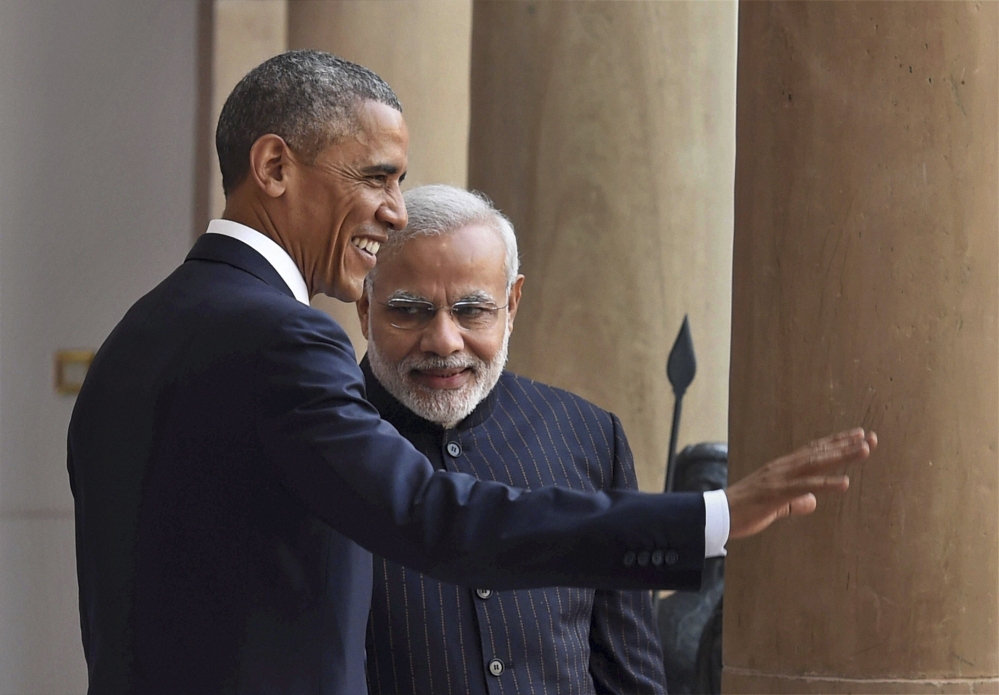NEW DELHI — At the start of a three-day U.S. presidential visit rich with pageantry and symbolism, President Obama and Indian Prime Minister Narendra Modi said on Sunday that the two countries have made progress toward resolving a long-standing impasse on civilian nuclear cooperation.
Obama said that the United States and India have reached a “breakthrough understanding” that would make it easier for U.S. firms and others abroad to invest in Indian nuclear power plants. Indian law holds suppliers, designers and builders of plants liable in case of an accident, making companies reluctant to invest in the plants. The two countries have also long failed to agree on how to track nuclear material.
The new understanding, although short on specifics, addresses two of a number of nuclear-related issues that have hamstrung relations for years, preventing implementation of a landmark civilian nuclear deal reached during the George W. Bush administration.
“We’re committed to moving toward full implementation,” Obama said. “And this is an important step that shows how we can work together to elevate our relationship.”
The White House said the agreement involved the provision of insurance pools and an assurance that reducing liability would be within the framework of the 2008 agreement. It will now be up to companies to decide whether to do business in India.
U.S. Ambassador Richard Verma said that the understanding was reached under the Indian system “through a memorandum of law” and would not require additional legislation.
LIABILITY AN ISSUE
Some voiced skepticism following Sunday’s brief announcement.
“The Indian government is going to town saying ‘breakthrough, breakthrough,’ but there are a lot of questions that still remain,” said R.R. Subramanian, a senior scholar of nuclear disarmament at the Institute for Defense Studies and Analyses in New Delhi.
U.S. companies and their advisers, meanwhile, said they had received no details about an agreement on liability or the tracking of U.S. nuclear materials that would be exported to India. On the liability issue, Bloomberg News quoted an Indian official as saying that an insurance pool worth $122 million would be set up, with the government contributing an unspecified amount at a later date. A key adviser to U.S. nuclear contracting firms — who spoke on the condition of anonymity to protect business relationships — said, “That doesn’t do it.”
Christopher White, a spokesman for nuclear construction firm GE Hitachi Nuclear Energy, said in a statement that the company “applauds the efforts of the U.S. and Indian governments” and that “we look forward to reviewing the governmental agreement.” White said GE Hitachi wants an agreement that “brings India into compliance with the International Convention on Supplementary Compensation,” which would cap liability in case of a disaster.
NUCLEAR CONCERNS REMAIN
U.S. nonproliferation experts also questioned whether Obama has the authority to waive a requirement to track nuclear materials that is part of the 2006 legislation that eased other restrictions on exporting to India.
“It would appear that the U.S. side has caved on a requirement set by Congress in the ‘Hyde Act’ of 2008 for implementation of any nuclear cooperation between the two countries that there must be an extensive ‘end-use monitoring’ program to help ensure that no U.S.-origin nuclear material or technology is diverted for military purposes,” Daryl Kimball, executive director of a nongovernmental group called Arms Control Association, wrote in an email to the National Security Council.
Nuclear power represents only about 2 percent of India’s total installed power capacity.
Obama and Modi said they had also made progress on other issues, including climate change, saying they are committed to phasing out carbon emissions and pursuing a “strong global climate agreement” at talks in Paris later this year. The two countries reached an agreement in September to help India shift to renewable fuels.
Renewable energy is scarce and expensive here, and about 300 million people live without power. Coal power is growing rapidly.
The two countries also renewed their 10-year defense framework agreement and agreed in principle to pursue co-development of weapons.
In many ways, it remains surprising that Modi has become the leader to advance the U.S.-India relationship. In 2005, the State Department revoked his visa on the grounds that he had violated religious freedom by not doing enough to stop Hindu-Muslim riots in 2002 while he was chief minister of the state of Gujarat. More than 1,000 people were killed.
Copy the Story LinkSend questions/comments to the editors.



Success. Please wait for the page to reload. If the page does not reload within 5 seconds, please refresh the page.
Enter your email and password to access comments.
Hi, to comment on stories you must . This profile is in addition to your subscription and website login.
Already have a commenting profile? .
Invalid username/password.
Please check your email to confirm and complete your registration.
Only subscribers are eligible to post comments. Please subscribe or login first for digital access. Here’s why.
Use the form below to reset your password. When you've submitted your account email, we will send an email with a reset code.